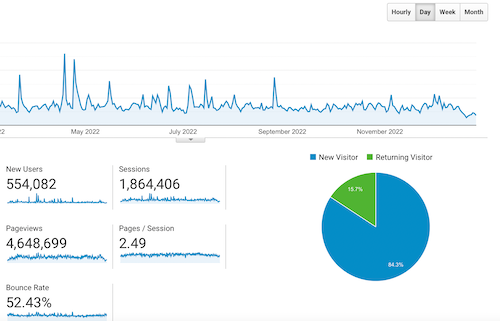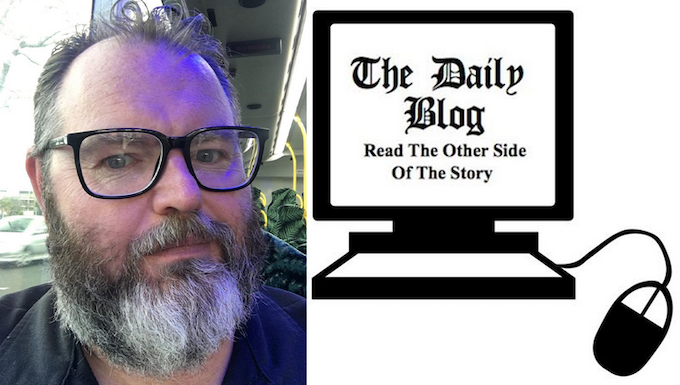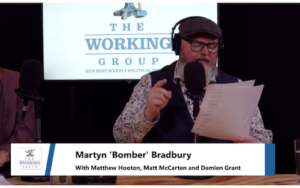
SPECIAL REPORT: By Sri Krishnamurthi for Asia Pacific Report
It has been a decade since The Daily Blog (TDB) came into being informing all and sundry of the political machinations in New Zealand.
Run by the Martyn “Bomber” Bradbury it serves the left of politics.
It had almost five million page views in 2022.
- READ MORE: How NZ’s Public Interest Journalism Fund can help ‘normalise’ diversity
- Other Daily Blog reports
“We had just under five million page views last year,” Bradbury told Asia Pacific Report.

“We have professor Wayne Hope from the AUT School of Communications; we have associate professor Susan St John from Auckland University, who is a poverty campaigner; John Minto who is a well-known political activist; and we have Mike Treen, a union boss.”
And they also have one of the country’s leading left analysts, Chris Trotter.
“We have anywhere between 10 to 20 bloggers,” Bradbury said.
TBD has been one of the go to blogsites for the political left.
“I think the idea when we set it up in 2013 was to provide an alternative commentary on the leftwing of opinion shapers,” he said.
Bradbury, who studied English at Auckland University and became a journalist on the job, believes debate is essential when discussing politics.
“I think we enjoy robust debate,” he said.
Nor does he blindly carry a candle for the leftwing government of the day even though he professes to belongs to the left.

“I think you have to be critical of everyone in power regardless of whether they are on your side or not,” said Bradbury, who was given his moniker “Bomber” by the Auckland University student newspaper Craccum.
“If you are writing commentary about the politics of the day you have to equally scathing for when the left are in, or the right are in, or you don’t have any credibility.
“We (TBD) are able to talk about things that are going on in politics and that is happening 24-48 hours ahead of the mainstream media; so I think people that are hungry to find out what is going on and have better oversight into the New Zealand political system can? So they come to us before you see it turn up in the mainstream media.”
He believes that journalism must be held to account.
“We have an obligation if you are the Fourth Estate to hold the powerful to account and the most powerful is the government of the day,” said Bradbury.
Public Interest Journalism
He said the government must provide for more investment in Public Interest Journalism (PIJ).
PIJ, a programme which started three years ago and is set to be concluded this year, needed to be continued, Bradbury said.
“I think it is a good start for the problem we have always had in New Zealand which is the market driven model, which is audience based advertising. We have always had too small a population to be able to support good journalism.
“But, there needs to be a lot more investment in public journalism for it to work.”
Nor does he see it, as many perceive it, as the government attempting to purchase favours from the media.
“I don’t see it as the government buying the media, I know that is a common critique that is used and brought up, but I don’t see it as black and white as that,” Bradbury said.
“We need to have public money go into journalism and there needs to be better checks and balances as to how that money is getting out there.
“There is a problem there, but overall I think that you can’t get a well-funded Fourth Estate that critiques the government of the day without having the state invested in that.”
He is advocating for a campaign to promote the benefits of better public interest journalism.
“We need a public service campaign similar to the one we have on our beaches where we have the ‘swim between the flags’ mantra.
“There has to be more public journalism funding to a vastly different group of media players and, by getting that funding they are able to show a little flag and we have a public campaign where we talk about ‘reading between the flags,’ so they know what they are reading is accurate and true.”
TVNZ-RNZ merger
Although the government has now shelved the TVNZ-RNZ merger after five years of work and many millions of dollars, Bradbury said it was only needed to see what was happening out in the public to realise people did not trust mainstream media.
“I think that the reason why we should have the merger is because we need to have a baseline public broadcasting that people can trust,” Bradbury said.
“We have all seen with real horror what happens when a large chunk of your population no longer believes certain agreed truths and we saw that on Parliament lawns last year.
“It is important to have public broadcasting that is trusted and believed because if we don’t have that it is very difficult to find common ground.
The emergence of rightwing radio — The Platform
“What we are seeing is the fracturing of the media world in New Zealand, and there are people who don’t believe in mainstream media anymore; people who have moved away from it and are searching out their own news,” Bradbury said.
“That’s fine as long as those media that are operating adhere to the basic values of journalism and stick to them.”
Jacinda Ardern
In the TBD Bradbury shared an excerpt from a podcast from TDB’s The Working Group which was rated as the best podcast in New Zealand in August last year by the Sunday Star-Times.

Bradbury related a story from January 24 the week that former Prime Minister Jacinda Ardern had to endure:
“Matt McCarten tells us a story of how at the end of last year, Jacinda and [her preschool daughter] Neve went out for a coffee with a friend of theirs at a cafe just in their private capacity. The way any mum with their daughter does every weekend.
“However, when Jacinda and their friend and Neve had settled down at a table, two people walked into the cafe after learning of Jacinda being in there, and started screaming at Jacinda and Neve telling them how they intended to hurt and kill Neve and Jacinda.”
“No mother should have feral lunatics screaming death threats at them and their child in a cafe.”
— TDB’s The Working Group
The TDB Working Group of 24 January 2023, Matt McCarten at 41m 46s.
“No doubt there was a tsunami of vileness that I don’t think I have seen in my political life that hit Jacinda,” said Bradbury.
“There was danger with forcing her out the way the angry right activists did, but the danger for them was that it was going create a backlash from the political swing voters who are 50+ female, tertiary educated.
“They would have seen the way Jacinda was forced out and they would have been quite angry with that; and we saw that in the first polls which saw Labour jump back up into the lead was a result of a political backlash.”
Radical social media
With the fracturing of media there has now developed radicalism on social media.
“Now we have a level of radicalism at play within social media,” Bradbury said.
“There are some strident leftwing voices and we’ve certainly seen some middle class identity politics and their de-platforming campaign; and we also have very extreme rightwing bloggers who are taking the debate in a very conspiratorial place which is very dangerous and polarising to the political debate in this country.
“We need healthy debate, but is it healthy when people in that debate have nothing but malice and spite to trade and are actually creating problems and not providing any solutions.”
Journalism
Bradbury believes journalism is at a crossroads but its principles must be upheld.
“Journalism is one of the most important careers in a democracy right now, and I bring it back to the misinformation and disinformation we have seen on so many online formats,” Bradbury said of the covid-19 pandemic years.
“If you can’t trust the material you’re reading, and if you have a citizenship that doesn’t know what is true anymore, then the basic standard of your democracy, the entire foundation that we are built on crumbles.
“So journalism is as important now than ever before.
“This is why we need a strong public service, this is no longer a nice-to-have, because I believe journalism is under so much threat because the alternative is voters who don’t know what is real and what is not.”
Roll on the election on October 14 and once again TBD will be at the forefront.
As a postscript, Bradbury was asked how was TBD faring financially.
He laughed before offering: “We get by, we are here for this election, we’ve been around for 10 years and I am always surprised that there is still a need for it.
“I’ll keep blogging as long as there is a readership for it.”
Sri Krishnamuthi is an independent journalist, former editor of the Pacific Media Watch project at the Pacific Media Centre and a contributor to Asia Pacific Report.







































